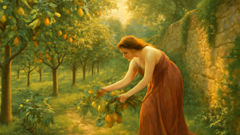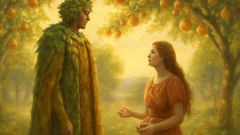Introduction
In the rolling countryside of ancient Italy, where sunlight scattered gold across vineyards and orchards, there lived a goddess whose devotion shaped the very heart of Roman agriculture. Pomona, patron of fruit trees and keeper of flourishing groves, was known not only for her gentle beauty but for her unwavering dedication to her craft. Morning after morning, she rose before the birds sang, tending to each branch with a loving touch, whispering to the budding figs and ripening apples, guiding nature’s bounty into glorious abundance. Unlike other goddesses, Pomona’s delight was not in grand temples or lavish adoration, but in the simple joy of healthy roots, rich soil, and the delicate swelling of fruit under her careful eye. Her orchards, tucked beyond the bustling cities and marble columns, became sanctuaries of shade and fragrance, where the air was always sweet and alive with the hum of bees. Yet Pomona’s solitude was legendary. She kept her gardens well-guarded, allowing neither mortal nor immortal suitor past the low stone walls. Many gods and fauns, intoxicated by her beauty, tried to win her favor with gifts or songs, but she turned each away with gentle firmness. Only the trees, vines, and silent earth witnessed the depths of her heart—a heart that seemed untouched by love’s fever. But fate, ever clever, wove another thread. For among the gods watched Vertumnus, the shape-shifting master of seasons, who yearned for Pomona’s affection with a patience as enduring as the olive’s root. Unlike others, Vertumnus understood the cycle of growth and change. He saw the beauty in Pomona’s constancy, and he was determined to win her—not with force, but with understanding and ingenuity. And so, in an age when gods and mortals often crossed paths beneath the branches of blossoming trees, began a story of longing, transformation, and the slow ripening of love.
The Goddess in Her Orchard
The walls around Pomona’s orchard were built from ancient tufa stone, softened by climbing ivy and the silent blessing of time. Within them, order and abundance reigned. Pears hung like lanterns among glossy leaves; figs, their skins taut and purple, clustered in cool shadows; apricots blushed beside twisting vines. Every root and bud bore the gentle signature of the goddess’s touch. Pomona’s hair was the color of ripe wheat, woven with ribbons of green and the stray petals that clung to her as she worked. Her eyes, gray as olive leaves, missed nothing. She spoke softly to the trees, and they responded in turn—unseen but unmistakable—by stretching toward her hands or yielding fruit with a rustle like laughter.

Though the orchard was her world, it did not exist in isolation. Beyond its boundaries, farmers sang praise to Pomona for their bountiful harvests. On festival days, offerings of fruit and honey were left at her modest shrine. She never attended these celebrations. Instead, she watched from between the branches, content with the knowledge that her labor brought joy to mortals and immortals alike.
Yet not all eyes upon Pomona’s groves were benign. Young satyrs, emboldened by wine and curiosity, sometimes tried to slip past the walls. They found themselves lost in bramble thickets or charmed by the heady scent of quince—diverted by enchantments as subtle as they were firm. It was not malice that turned them away, but a boundary Pomona herself had set. She guarded her solitude as fiercely as her trees. The gods, too, were persistent. Priapus, god of gardens, attempted to woo her with bawdy jokes and garlands of poppies. Silvanus, lord of forests, offered her wild roses and whispered promises of eternal spring. Pomona listened politely to each, thanked them, and returned to her pruning knife or watering can. Her heart remained her own.
One evening, as amber light faded and the air shimmered with the promise of autumn, a stranger appeared at the orchard’s edge. He wore the rough tunic of a ploughman and leaned on a staff fashioned from laurel. His hands were stained with earth, his eyes quick and bright. Pomona did not greet him; she continued gathering pears. The ploughman watched her for a time, then spoke of the coming rains and the necessity of proper drainage for the roots. His words were knowledgeable, his advice sound. Surprised, Pomona replied in detail, discussing grafting and the health of her quinces. The ploughman nodded, smiled, and departed.
He returned the next day, but in a different guise—a fisherman this time, bearing fresh river trout and speaking of the balance between water and soil. Again, Pomona found herself drawn into conversation. Each day brought a new visitor: a shepherd boy with tales of mountain herbs; an old woman who shared secrets about medicinal leaves; a vinedresser who admired her method of training apple branches along trellises. Each time, Pomona found herself inexplicably willing to listen. Yet as soon as she searched for her mysterious guest at dusk, he had vanished.
Vertumnus: The God of Change
What Pomona did not know was that all these visitors were Vertumnus, god of transformation and the seasons. In his divine patience, Vertumnus had watched Pomona for years—first from afar, disguised as a simple vine twining up her wall or as a songbird flitting through the canopy. He admired her devotion and the order she brought to wild nature, a mirror to his own endless work changing leaf to bud, blossom to fruit, fruit to seed.

But Vertumnus was not a god content with idle longing. He thrived on change, on possibility, on the dance between what is and what might be. He had tried to approach Pomona in many ways. As a satyr, he had hoped mischief would win her smile; as a handsome young man, he had tried flattery. Each time, Pomona remained polite but distant, preferring the company of her trees to that of any suitor.
It was then that Vertumnus understood: only through patience and true understanding could he hope to reach her heart. He began to appear in humble guises—laborers, elders, even animals—each time learning from Pomona, each time offering wisdom instead of desire. He became part of her orchard’s daily rhythm, his presence as natural as the sun’s arc.
One day, disguised as an old woman, Vertumnus found Pomona trimming a stubborn olive branch. With a crooked smile and a basket of late peaches, the old woman began to speak not of trees or weather, but of love. She told a story of a young girl who spurned every suitor until one patient soul won her heart by kindness alone. Pomona listened quietly, uncertain why the tale lingered in her mind long after the old woman shuffled away.
The gods above watched Vertumnus’s efforts with amusement. Mercury wagered he would give up; Venus, amused, sprinkled a little extra sweetness in Pomona’s figs. Only Ceres, goddess of grain, truly understood what was at stake. She whispered to Pomona’s ear in dreams, urging her to consider that life, like seasons, changed whether one wished it or not.
The Persuasion of the Heart
As the weeks slipped by and summer leaned into autumn, the orchard changed in subtle ways. Apples blushed deeper, grapes grew heavy on their vines, and Pomona began to sense a gentle restlessness in herself—a question she could not name. The mysterious visitor continued to arrive in ever more ingenious forms: a beekeeper with stories of honey’s magic, a gardener admiring her apple espalier, even a wounded deer limping at dusk. Always, Pomona’s reserve softened a little more.

Then one morning, as dew still jeweled the grass and mist rose from the earth, Vertumnus returned—not in disguise, but in his true form. He was tall and handsome, his hair dark as plums and his eyes shifting with the colors of every season: emerald in spring, gold in summer, russet in autumn. He wore a cloak of woven leaves and bore in his hands a cornucopia overflowing with every fruit Pomona had ever coaxed from her trees.
Pomona recognized him at once as both stranger and familiar presence—the shape-shifter who had listened, advised, and watched her work with genuine awe. For a moment, her heart fluttered like a startled bird. She did not flee, but met his gaze directly. Vertumnus spoke, his voice gentle but clear. He praised her skill and devotion, not for flattery but because he truly understood the care required to nurture life from root to branch.
He spoke of change—not as a threat, but as a promise. “Without change,” he said, “the flowers would never become fruit; the fruit would never yield seed; and the orchard would never endure from one season to the next.” He spoke of his love not as conquest or possession, but as partnership—a joining of strengths, a weaving of their gifts for the good of all growing things.
To persuade her heart, Vertumnus told a story within a story: how a willow fell in love with the sun, but only through patience and transformation did it find the courage to grow tall and bear shade for others. His words painted pictures in Pomona’s mind—of orchards not isolated but thriving together, of seasons turning with gentle inevitability, of love that deepened with every cycle.
Pomona listened, her heart softening. She realized that Vertumnus’s love was like her own work: not showy or urgent, but patient, attentive, and life-giving. She saw herself not as a fortress to be breached, but as a garden ready for new growth. When Vertumnus finished speaking, Pomona set down her pruning knife. She reached for his hand—callused as any gardener’s—and together they walked beneath the fruit-laden branches, silent but smiling.
Conclusion
Thus the orchard blossomed as never before. Pomona and Vertumnus tended the groves side by side—he guiding the seasons in their gentle turning, she nurturing every bud and fruit with steadfast care. Under their combined touch, the trees flourished beyond mortal imagining: apples glowed like rubies, figs split with honeyed sweetness, and the air was thick with the fragrance of ripening abundance. Villagers whispered that the goddess no longer walked alone; that laughter now drifted from the orchard walls at sunset; that every harvest seemed richer since Pomona had found her companion. In time, even the gods acknowledged the power of gentle persuasion and patient love. Statues of Pomona and Vertumnus appeared in gardens throughout Italy, symbols of harmony between constancy and change. Their story passed from mouth to mouth—from poets to farmers, mothers to daughters—reminding all that love’s truest form is not conquest or sudden passion, but the slow, joyful growth of trust. And so, long after the last fig had fallen and the groves grew silent with winter’s hush, the orchard’s enchantment lingered—a living testament to the union of the goddess of fruit trees and the god of seasons, and to the enduring truth that all things flourish when love is allowed to take root.













